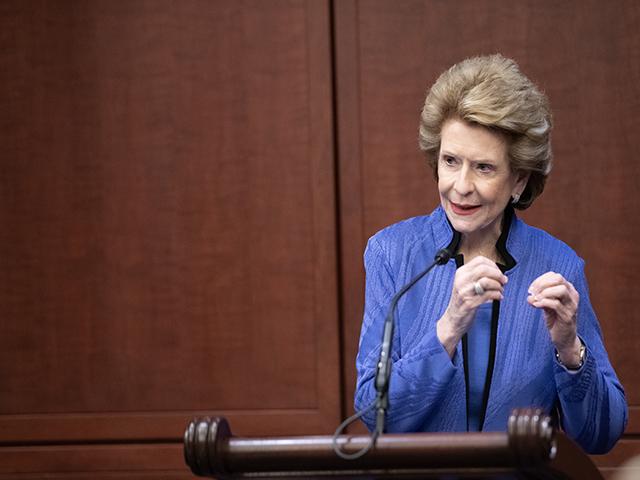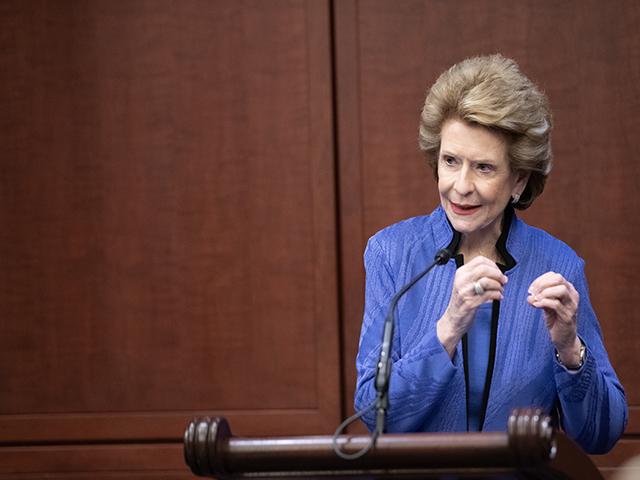Ag Policy Blog
Stabenow Sees Promise in GOP Proposal to Boost Premium Subsidies
WASHINGTON (DTN) -- With a new proposal on the table by Senate Republicans to increase crop insurance premium subsidies rather than focus on raising reference prices, the Democratic chairwoman of the Senate Agriculture Committee said it is time to move ahead with farm bill negotiations.
Sen. John Hoeven, R-N.D., and other Republicans on the Senate Agriculture Committee proposed the Federal Agriculture Risk Management Enhancement and Resilience (FARMER) Act earlier this week. The bill would increase premium support for farmers' crop insurance bills and make higher levels of coverage more affordable for producers.
Senator Debbie Stabenow, D-Mich., chairwoman of the committee, told DTN in an email she is "glad" Hoeven made the proposal and is ready to move ahead with more talks on a new farm bill.
"Crop insurance is the No. 1 tool in the farm safety net, and I'm glad that Senator Hoeven and others are exploring ways to improve it rather than just focusing on reference prices," Stabenow said in the email.
Stabenow noted that in January she made a proposal to provide higher levels of crop insurance premium subsidies. Her proposal would require farmers who want the higher premium subsidies to opt out of the traditional Title I commodity subsidies, while Hoeven said his proposal would allow them to continue to qualify for those programs.
"I floated a proposal in January that would give farmers an additional choice of enhanced crop insurance to try to shake things loose on farm bill negotiations. I'm glad this worked. Now, let's get our ideas on the table and find a bipartisan path forward. That is how you get a farm bill done."
The Congressional Budget Office told Hoeven his bill would increase the cost of crop insurance by $4.2 billion over ten years, a Hoeven spokesperson said. The most recent Congressional Budget Office projections say crop insurance would cost $124.7 billion over ten years, the Food and Environment Reporting Network said in an analysis.
"Ultimately, producers buying higher levels of coverage will lessen the need for ad-hoc disaster assistance in the future," Hoeven said at a news conference.
P[L1] D[0x0] M[300x250] OOP[F] ADUNIT[] T[]
BOOST PREMIUM SUBSIDIES FOR HIGHER COVERAGE LEVELS
The bill would increase premium support for certain revenue protection and yield protection policies.
At the 80% coverage level, premium subsidies would rise from 68% to 77%; At the 85% coverage level, the premium subsidies would increase from 53% to 68%.
The bill also would improve the Supplemental Coverage Option (SCO) -- a county-based add-on policy -- by increasing premium support and expanding the coverage level. The bill would increase the premium support for SCO from 65% to 80% and increase the SCO coverage level from 86% to 90%.
The bill also would direct the Risk Management Agency (RMA) to conduct a study to improve the effectiveness of SCO in counties larger than 1,400 square miles.
Hoeven's bill has received the backing of a long list of farm organizations.
"Increasing the affordability of crop insurance is a top priority for our farmers," said Kenneth Hartman Jr., first vice president of the National Corn Growers Association, who was present at the press conference on Capitol Hill when the FARMER Act was announced. "We applaud Sen. Hoeven and his colleagues' efforts in ensuring that these risk management tools continue to be improved and meet the challenges producers face today."
CRITICISM OVER HIGHER INSURANCE COSTS
The Environmental Working Group, a frequent critic of crop insurance, challenged the need to provide higher premium subsidies to farmers.
"Both of the FARMER Act's proposed changes to crop insurance would drive up taxpayer costs for an already expensive program," said Anne Schechinger, EWG Midwest director. "The program currently costs billions of dollars each year yet mostly benefits the largest and wealthiest farms, who do not need more taxpayer support.
"In a year when it will be difficult to find money to increase funding for any program in the farm bill, the Senate should focus not on increasing crop insurance subsidies but instead on reducing the costs of the crop insurance program and protecting conservation funding for climate-smart agriculture," Schechinger added.
CROP INSURANCE A VITAL SAFETY NET
When announcing the bill, Hoeven said crop insurance is an essential piece of the farm safety net for farmers and their most important risk management tool.
"I have heard from producers across North Dakota about the need to make this important program more affordable," Hoeven said. "As such, we're working to not only defend crop insurance, but improve it. That's how we're going to keep the farm in the farm bill. My legislation will make higher levels of coverage more affordable across the country, especially in states where it's currently prohibitively expensive to buy up. Ultimately, producers buying higher levels of coverage will lessen the need for ad-hoc disaster assistance in the future. That means a more resilient ag economy and a better deal for taxpayers."
Also see, "Despite Presidential Election, Farm Bureau Sees a Path for Congress to Pass a Farm Bill," https://www.dtnpf.com/…
DTN Ag Policy Editor Chris Clayton contributed to this report.
Jerry Hagstrom can be reached at jhagstrom@nationaljournal.com
Follow him on social platform X @hagstromreport
(c) Copyright 2024 DTN, LLC. All rights reserved.






Comments
To comment, please Log In or Join our Community .